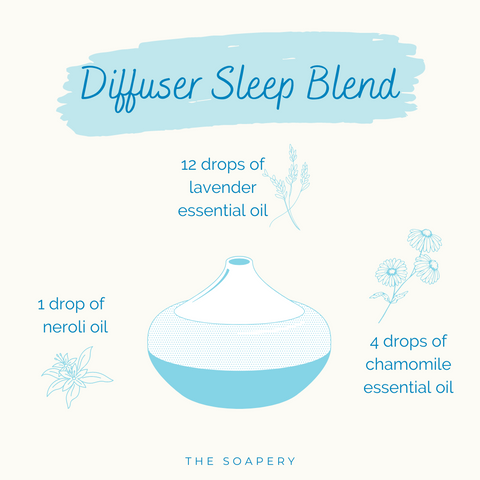There's no doubt about it, we all need a good night's sleep. Unfortunately, restful sleep isn't always easy to come by. It is estimated that around a third of adults in Western countries experience sleep problems at least once a week.[1]
So, how can essential oils help you to get a good night's sleep?
We've gathered recommendations from aromatherapists, looked at the scientific studies, and put it all together for you to try at home.
Read on to find out more.
Contents
- Signs and symptoms
- Why use essential oils for sleep?
- Best essential oils for sleep
- How to use essential oils for sleep
- Conclusion

Signs and symptoms of sleep problems
Before we dive in to how essential oils can help, lets be a bit more specific about what we mean by sleep problems. These are the main issues:
- Trouble falling asleep
- Difficulty staying asleep
- Feeling exhausted after waking up
- Sleep disturbance
Causes
Unfortunately there a wide range of causes, narrowing it down can be tricky.
Small adjustments to your routine can help, like having half an hour without any screens before bed, or a relaxing bath. Sometimes though, more serious things are causing it, for example:
- Stress
- Illness
- Medical conditions including depression or anxiety
Effects
The effects of sleep problems can really follow you around and make your day difficult. Here's some of the main effects:
- Irritability
- Lack of focus when performing tasks and/or increased mistakes
- Tiredness during the day
- Forgetfulness.[2]
Why Use Essential Oils for Sleep?
Many essential oils can help people with mild sleep problems.[3] This makes them well placed to help improve sleep quality.
Essential oil molecules can directly affect the limbic system which connects to vital functions of the body such as heart rate, breathing, stress levels, memory, and blood pressure.[4]
Essential oils have been used in aromatherapy for many years, and a couple of essential oils have generated a reputation for being able to help people get a better night's sleep.
But what's the evidence? Lets jump in and take a look.

Lavender Essential Oil for Sleep
One of the most popular essential oils which is used to help people get a better night's sleep is lavender oil (Lavandula angustifolia). Lavender oil has a sweet, floral aroma with notes of woodiness. It is well liked by many due to its familiarity.
Many research studies have been carried out on the effectiveness of using lavender essential oil for sleep including:
A single-blinded, randomized pilot study evaluating the aroma of lavender oil as a treatment for people struggling to get enough sleep. They concluded that lavender oil helps in promoting sleep. Women and younger volunteers with a milder insomnia improved more than others. [5]
However, this was only a pilot study and more research is needed.
Another study on lavender oil and insomnia was undertaken on women college students. They concluded that lavender fragrance improved the time it took to fall asleep and sleep quality.[6]
However, it isn't clear whether the study used lavender oil, or a synthetic lavender fragrance.

Chamomile Essential Oil for Sleep
Although the general term “chamomile” is often used to describe chamomile essential oil, there is, in fact, more than one type of chamomile oil.
In general, chamomile essential oil in aromatherapy use is usually one of two chamomile species: Roman (Chamaemelum nobile) and German chamomile (Matricaria recutica). Both are used interchangeably in aromatherapy use and have a similar aroma, that is sweet and apple-like.
Research studies which support the use of chamomile for more restful sleep include:
A pilot study looked at 20 students over 2 weeks. They found that chamomile essential oil helped students get a better night's sleep.[7] However, this is only a pilot study
This study looked at the effect of a lavender, chamomile and neroli blend on sleep quality and found that this blend promotes sleep and helps in reducing anxiety. [8]
Even though chamomile has a reputation in aromatherapy for being able to help as a sleep aid, the scientific evidence is quite low quality.

Peppermint oil
Peppermint oil has a fresh, minty aroma that is instantly recognisable. There is some evidence that it can help you get a good night's sleep.
A randomised study on 105 cardiac patients found that peppermint oil and lavender oil had similar positive effects on sleep quality. [9]
Other essential oils
There are some other oils that have been researched for improving sleep quality.
A small 2019 study found that a blend of lavandin, ylang ylang and bergamot essential oil promotes better sleep quality but not more hours of sleep. [10]
A 2017 study used a blend of lemon, eucalyptus, tea tree and peppermint oil and found that it helped improve sleep quality and reduce stress in 60 volunteers. We've given the recipe below in our inhaler blend.
How to use essential oils for sleep
So now we've been through the evidence, lets get practical. How can we use essential oils to help improve sleep?
The good news is that there's plenty of options, here's a few:
- Using a diffuser in the bedroom
- Using a personal inhaler stick before bed.
- Creating a room spray with an essential oil blend for sleep
- Massage of an aromatherapy blend around the temples, neck, and head area.
So how could you try these at home, and what essential oil blend should you use? Read on for our expert tips!

Diffuser Blend for Sleep
This blend is for use in an diffuser and it was used in one of the studies for a sleep aid.
Essential Oils:
- 12ml Lavender oil
- 4ml Chamomile oil
- 1ml Neroli oil
How To Use:
- Add 5 drops of the blend to a diffuser (or as per manufacturer's instructions).
- Run the diffuser for 20 minutes before bed.

Inhaler Blend for Sleep
This blend uses a personal inhaler aroma stick. You can purchase these types of inexpensive inhalers from places like Amazon.
Essential Oils:
- 4 drops Lemon oil
- 2 drops Eucalyptus oil
- 2 drops Tea tree oil
- 1 drops Peppermint oil
To Make:
- Mix the essential oils together in a jug.
- Soak the wick of the inhaler in the blend until it is fully absorbed.
- Insert the wick into the inhaler. Secure the bottom of the inhaler firmly and cap.
To Use:
- Inhale as needed before sleep.
Cautions:
- For adult use only. Avoid direct contact with your nose as it may cause irritation.

Aromatherapy Room Spray for Sleep
Try making your own room spray with this sleep blend, try spraying it around your bedroom an hour before sleep.
Essential Oils:
- Roman chamomile 14ml
- Lavender oil 7ml
Base for Blend:
- Water 100ml
- Polysorbate 80 20ml
- Geogard Ultra preservative 3g
To Make:
- Weigh your water in a jug
- Put gloves and safety glasses on
- Weigh your Geogard Ultra
- Add it to your water and mix well
- Measure your polysorbate 80 and essential oils into a separate jug
- Whisk these into your water mixture
- Leave to settle before pouring into a spray bottle

Aromatherapy Massage Blend for Sleep
This blend is diluted in a carrier oil so that you can apply the essential oil topically. Massage gently into your temples to help you relax before sleep. [12]
Essential Oils
- Marjoram essential oil 9 drops
- Vetiver essential oil 8 drops
- Lemon essential oil 14 drops
- Sweet almond oil 60mL
To Make:
- Measure your almond oil
- Add your essential oils
- Mix well
- Pour into a bottle
To Use:
Massage lightly over the neck, temples, upper back, and head area (avoiding your eyes) for a calming effect.
Cautions:
For adult use only. Discontinue use if skin irritation occurs.

Aromatherapy Bath Blend
Add a few drops of this blend to a warm bath to help relieve stress before sleep. This blend is mixed with polysorbate 80 because you should never add essential oils to a bath without a solubiliser.
Essential Oils:
- Clary sage oil 3ml
- Vetiver oil 2ml
- Valerian oil 1ml
- Lavender oil 1ml
- Polysorbate 80 7ml
To Use:
Add a few drops of the blend to a warm bath.
Conclusion
Certain essential oils can help promote sleep and reduce anxiety. Lavender and chamomile essential oils have the best quality evidence supporting their use as a sleep aid.
There's many ways to try and use essential oils for sleep, the easiest ways are probably to use a diffuser, or make a bath blend.
Continue reading
Now that you've learned how to use essential oils for sleep, why not continue learning?
- Interested in hair growth? Read the evidence on whether rosemary oil is good for hair growth
- We've collected the best seven essential oils for mood, read our blog post to find out more!
- Want to try soap making? Find out how to use essential oils for soap making
- Looking for more tips on how to sleep well? Here's a good resource with some tips.
References:
- National Institute for Clinical Excellence, Insomnia, accessed from: Prevalence | Background information | Insomnia | CKS | NICE
- Mayo Clinic, Insomnia, accessed from: https://www.mayoclinic.org/diseases-conditions/insomnia/symptoms-causes/syc-20355167
- Angela S. Lillehei and Linda L. Halcon. A Systematic Review of the Effect of Inhaled Essential Oils on Sleep. The Journal of Alternative and Complementary Medicine. Jun 2014.441-451.http://doi.org/10.1089/acm.2013.0311
- University of Minnesota, How Do Essential Oils Work?, accessed from: https://www.takingcharge.csh.umn.edu/how-do-essential-oils-work
- George T. Lewith, Anthony Dean Godfrey, and Philip Prescott.A Single-Blinded, Randomized Pilot Study Evaluating the Aroma of Lavandula augustifolia as a Treatment for Mild Insomnia.The Journal of Alternative and Complementary Medicine.Aug 2005.631-637.http://doi.org/10.1089/acm.2005.11.631
- Effects of Lavender Aromatherapy on Insomnia and Depression in Women College Students, Lee, Inn Sook, Lee, Gyung Joo, 2006/02, 2006/02/28, doi: 10.4040/jkan.2006.36.1.136, Korean Society of Nursing Science, 1598-2874, http://dx.doi.org/10.4040/jkan.2006.36.1.136
- Jaroenngarmsamer, P., Pajongsaleepanya, K., Rojanabenjakun, P., Ounprasertsuk, J., Benjanirat, T., Krutchangthong, S., & Choawai, S. (2021). Efficiency of Chamomile Essential Oils on Sleeping Quality of First-year University Students. Indian Journal of Forensic Medicine & Toxicology, 15(2), 3724-3731. Efficiency of Chamomile Essential Oils on Sleeping Quality of First-year University Students | Indian Journal of Forensic Medicine & Toxicology (medicopublication.com)
- Cho et al (2013) Effects of Aromatherapy on the Anxiety, Vital Signs, and Sleep Quality of Percutaneous Coronary Intervention Patients in Intensive Care Units https://www.ncbi.nlm.nih.gov/pmc/articles/PMC3588400
- Mahdavikian et al (2020) Comparing the effect of aromatherapy with peppermint and lavender on the sleep quality of cardiac patients: a randomized controlled trial | SpringerLink
- McDonnell and Newcomb (2019) Trial of Essential Oils to Improve Sleep for Patients in Cardiac Rehabilitation | The Journal of Alternative and Complementary Medicine (liebertpub.com)
- Lee et al (2017) The effects of aromatherapy essential oil inhalation on stress, sleep quality and immunity in healthy adults: Randomized controlled trial https://www.sciencedirect.com/science/article/abs/pii/S1876382017300951
- The Fragrant Pharmacy Valerie Worwood 1990 p106



